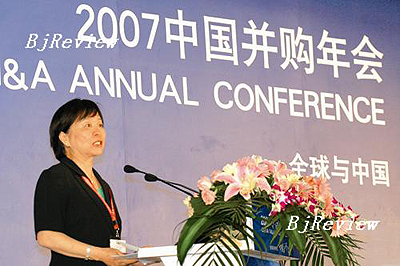
At the 2007 China M&A Annual Conference in Tianjin, Wu Xiaoling, Deputy Governor of the People's Bank of China, pointed out that the slow pace of private equity fund growth is partly to blame for insufficient resources available for creating healthy public companies.
Article 50 of China's Securities Law states that all public companies should have a minimum capitalization of 30 million yuan, a requirement many start-up companies find hard to meet. But what if a start-up company is in need of financing during the period from inception to IPO? Private equity is an indispensable solution for companies in this period in terms of funding future growth.
In general, sector funds invest in companies with mature technologies; venture capital funds invest in hi-tech firms; and private equity funds primarily focus on companies approaching their IPOs, which are catalysts for boosting the value of start-up companies and a major driver of mergers and acquisitions.
"We need a further boost in yuan investment funds," Wu said. "With China's dual-surplus in its balance of international payments, we are no longer short of foreign exchange. The inflow of overseas private equity funds will bring advanced technologies and help groom talent. Therefore, we need to borrow ideas from overseas private equity funds."
When asked about the government's role in supporting the development of private equity funds, Wu responded that the government should first work on building a highly qualified management team for enhanced supervision of fund companies. Be it private equity funds that raise money from a small scope or public funds with a broader range of fundraising sources, the essence of their business is financial management and the quality of their team is the key, she said. The government should step up the grooming and supervision of funds management teams rather than focusing on the investment projects themselves, she added.
Furthermore, the government needs to improve legislation regarding the supervision of asset management institutions, according to Wu. For example, the U.S. Investment Company Act of 1940 and the Investment Advisers Act of 1940 were set in place to regulate funds management conduct. However, China's private equity funds came into being without such laws. The addition of limited partnerships in the latest Partnership Enterprise Law provides a legal basis for institutional engagement from banks and insurers in private equity funds. Supervisory bodies are therefore advised to keep up with the times and duly revise the laws and regulations.
"It has become a trend that financial institutions take part in private equity funds, so the government is advised to allow banks, insurance companies and social securities firms to hold stakes in private equity funds," said Wu. As private equity funds put investments in start-up businesses, high risks may ensue, but high returns are also expected. "Financial institutions run risks, and it's vital to keep the risks within the controllable range rather than concentrating on the risks themselves."
Regulators of institutional investors and main shareholders are advised to examine the investment portfolio concept, risk control and risk appetite, before deciding whether or not to let institutional investors become involved with private equity finds. "About 1-2 percent of capital set aside from banks or insurance companies for high-risk investments will not detract from their healthy operation," Wu said. "Every financial institution should have appropriate risk investment portfolios."
The other pivotal role of the government is to pave the way for private equity funds to exit their investments. The number of businesses trading on the exchange is small after all. In the United States, public companies account for only 1.99 percent of all joint stock companies and the percentage in Japan and Hong Kong is 1.3 percent and 2.3 percent respectively.
It is essential to clear the way for developing over-the-counter channels such as growth enterprise markets and perfecting market-maker regulations. At present, nurturing the varied layers of the capital market is a top priority. "Without over-the-counter trading and private equity dealing outside the exchange, it could be difficult to create a favorable environment in which enterprises can mature and grow, and it would also be impossible to provide healthily-running candidate companies to the exchange," Wu said.
Running partners
The revised version of the Partnership Enterprise Law, effective as of June 1, offers vast information in favor of private equity funds-the introduction of limited partnership will be the right solution to the issues of trusts and taxes which have hindered the growth of private equity for some time.
Wang Weidong, attorney at Grandall Legal Group, said that the most popular legal form of existence for private equity funds in China is a limited company. That is, he explained, a fund operates as a limited company. Investors maintain their rights as shareholders, and fund managers, either in the capacity of shareholder or investment advisor, take the management role.
| 